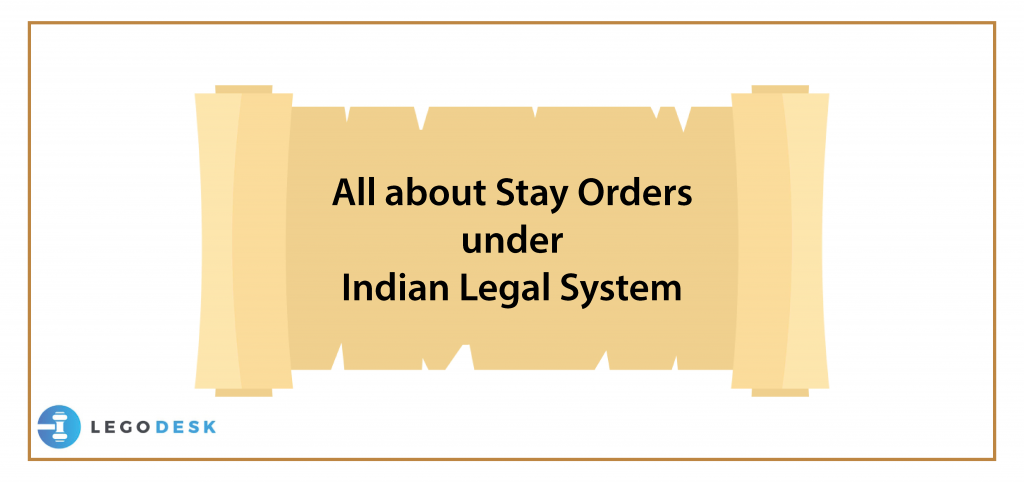All about Stay Orders under Indian Legal System
Introduction
Stay order under the Indian legal system is the act of temporarily stopping or suspending a judicial proceeding by order of a court. A judge may grant a stay on the actions of one party to the case when it is necessary to secure the rights of the other. A stay order means that the action which has been stayed would not be operative from the date of the passing of the order, but it does not mean that it will be wiped out of existence.
Also, when a stay order is passed the status of things at the issuance of the order remains the same until the order is valid or decided by a judge. Every court has been given the inherent power to temporarily suspend the proceedings in any case where the plaintiff is in default or has disobeyed any lawful order of the court. Proceedings can stay absolutely or conditionally.
Read Also – Bitcoin: Myth or Reality? in present Indian Legal System
Types of a stay Order
There are two major types of stay orders in the Indian legal system: a stay of execution and a stay of proceedings. A stay of execution postpones the execution of the judgment, i.e., its enforcement against the party who has lost a case whereas the stay of proceedings halts the further legal process in a trial or any other legal proceeding.
As per the Federal Rules of Civil procedure, every civil judgment stayed for a period of ten days after it is pronounced. An extension can be made which only lasts for a limited period and is usually granted when the case goes into appeal. But a court may grant a stay of execution in any case in which it feels that it is necessary to provide justice to the matter in hand. In criminal matters, stay of execution may stop a death penalty temporarily, which then allows an additional appeal to the condemned prisoner. Such a stay of execution can be granted by executives, Governor, or the President.
When there has been a stay of proceedings, the court can subsequently lift the stay at any time and resume the proceedings based on the circumstances after the stay is suspended. There can be a number of reasons for such a stay such as another action relating to the case may be in a process that may affect the case or the rights of the parties to the case.
Read Also – Federal System in India and Its Elements
Getting a Stay Order
There is power with the court to stay execution under Order 21 Rule 26 of the Civil Procedure Code. The applicant has to establish a prima facie case, i.e., it should be clear at first instance that the circumstances mentioned in the application are possible and order is urgently required. It has to be prayed before the court to grant stay in the process while the case is subjudice. Also, the petitioner/appellant shall prove before the court that the particular process shall injure the person, or it may make the judicial proceeding complicated if it is allowed to continue.
Duration of Stay Order
An order was passed by the Supreme Court which said that stay orders in both Civil and Criminal Proceedings cannot be granted for a period of more than six months but can further be extended only by a speaking order. A maximum limit has been fixed to allow speedy disposal of cases because the number of pending cases in India is very high. This order can have a far-reaching impact on thousands of cases pending in various courts. It was mentioned that the period of stay order in any pending criminal or civil trial proceedings would commence from the date issued. The only exception of speaking order will allow an extension if it is proven that continuing the stay was more important than having the judgment finalized.
A speaking order is an order which speaks in itself, which means that it should be sufficient enough to satisfy its purpose. An order having civil consequences must contain reasons to support it. The order should also contain all the details of the issue, clear findings, and a reasoned order and must show the exceptional nature of circumstances.
This timeline has been fixed with the view that trials are expected to be concluded normally in one to two years to prevent injustice. The order was passed as a result of a plea dealing with an issue relating to the Prevention of Corruption Act. The underlying principle is that if the stay is granted, it should not in normal circumstances be unconditional or for an indefinite duration. Certain reasonable conditions need to be imposed so that the party in whose favour stay is granted accountable if the court finally finds no merit in the matter and the opposite party suffers a loss due to the injustice.
Conclusion
The basic purpose of a stay order is to prevent injustice from any of the parties involved in a case. After the passing of a stay order, the party against whom such order is passed can state reasonable grounds to get it cancelled. Stay order can also mean any number of legal measures taken by a legislature to provide temporary relief to debtors. Fixing a timeline for stay orders solves the problem of judicial delay because stay orders can worsen the issue of pending cases.
Try our Debt Resolution solutions today Request a Demo

Please inform regarding my case in high court my
CNR no- HSBM
Please provide me current status in high court ASAP.
My case CNR no-HCBM010079952020